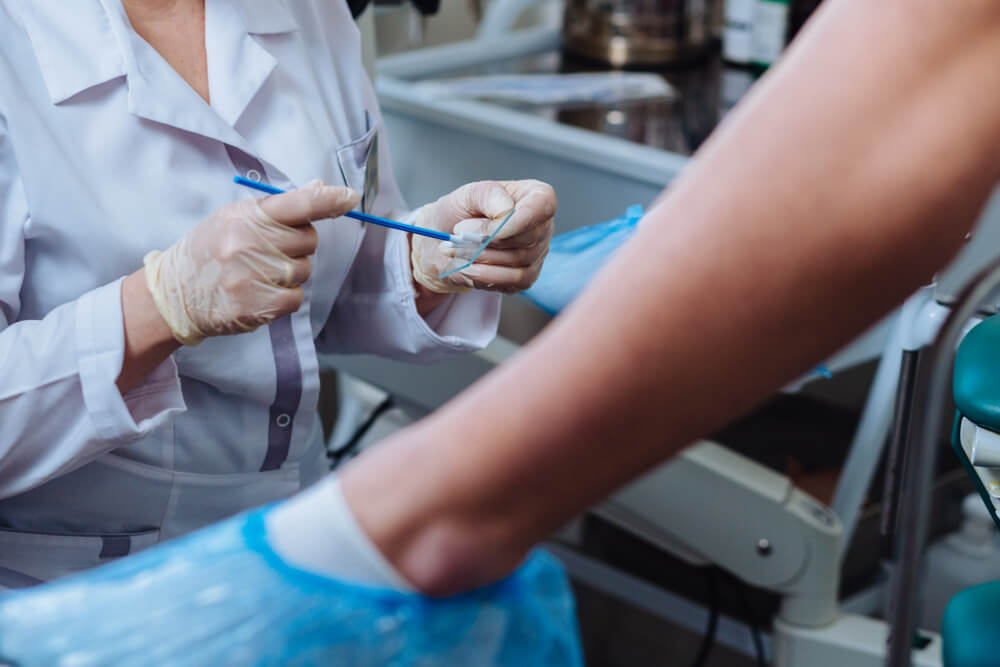Probably your gynecologist has already done your Pap test, and you are waiting for the results, or you are preparing to do it for the first time. Whatever the case is, whether you are worried about the outcome of the Pap smear or want to learn more about the possible results, you are in the right place to find out more about the Pap test itself, the procedure, and its normal or abnormal results.
Waiting for results is never pleasant and makes you nervous, especially when it comes to such a sensitive topic as health.
No woman is comfortable when she needs to have a Pap test and other gynecological exams, but your gynecologist, with expertise and understanding, will help whatever the result may be.
You haven’t scheduled your gynecological appointment and Pap test yet and you are still looking for your doctor to perform these exams? At Doral Beach Gynecology, you can find a gynecologist in Miami who will explain everything to you and pay close attention to you and your exam results.
What Is a Pap Test?
A Pap test or Pap smear is a part of the gynecological exam that is done for early detection of cervical cancer. The most effective and most accurate results are obtained if a Pap smear is combined with other tests.
A Pap test is easy to perform and is not a painful exam, but it is not pleasant either. However, it’s necessary to detect changes in cervical cells, which may indicate the possibility of developing cancer or cancer itself.
Don’t worry, it doesn’t mean you have cancer if your gynecologist suggests a Pap test at your annual exam. This method checks your gynecological health and serves as a preventive exam as well as a way to detect changes inside the vagina.
If you haven’t had a Pap test yet, here’s what it looks like: A cervical cell sample is taken from the cervix with a stick and brush from the front and back of the cervix and the cervical canal. The sample is then examined under a microscope to see if there are any abnormal cervical cells.
This way, cancerous changes can be detected at an early stage and can be cured and removed before they develop and before the patient’s condition becomes more severe. A Pap test can be a lifesaver.
If you have questions or concerns, and reside in the Miami area, feel free to contact us. You can freely ask Leonardo Blachar MD for more information on the importance of the Pap test for your health.

When and Why Should You Do a Pap Test?
If you do not have any problems such as pain, changes in vaginal secretions, unusual bleeding, etc., gynecologists recommend that you should do the first Pap smear when you are 21 and repeat it every three years.
Women over the age of 30 are advised to combine a Pap test with a human papillomavirus (HPV) test every five years. If Pap test results are not within normal limits, the doctor will most likely do a colposcopy for more accuracy.
At the age of 65, if everything was fine with your health before, you will stop having Pap smears. Also, it is not necessary to have a Pap smear if the person has had a total hysterectomy.
In some situations, the gynecologist recommends more frequent control of cervical cells by Pap test:
- Abnormal Pap test result
- Cervical cancer or other gynecological cancer was diagnosed
- HIV / AIDS
- Diseases of the immune system
- After the use of chemotherapy, corticosteroids, organ transplantation
- Smoking or other addictions
- You’re at high risk of cervical cancer
Pap Smear Results
Pap test results can be:
- Normal – only normal cervical cells are found, and you can rest assured until the next annual exam because the result is negative.
- Abnormal – abnormal cervical cells have been found, and the test is positive, so the doctor will perform further examinations.
There are two types of classification of test results:
- Old classification:
- PAP I – a normal result
- PAP II – atypical inflammatory changes
- PAP III – dysplasia (mild, moderate, or severe)
- PAP IV – carcinoma in situ or precancer
- PAP V – suspected invasive cancer.
- New classification:
- CIV 1 – mild dysplasia
- CIV 2 – moderate dysplasia
- CIV 3 – severe dysplasia
- CIS – carcinoma in situ or precancer.
What Does an Abnormal Pap Smear Mean?
If your doctor has told you that you have a positive Pap smear result, they will probably suggest a colposcopy or some other exam such as a biopsy.
However, you should not panic right away – a positive result does not mean that you have cervical cancer.
There is a possibility of obtaining false-positive and false-negative results. A test is false positive when it shows changes that do not exist and false negative when it does not show changes that exist. For this reason, a Pap test is repeated and combined with other methods, just to be sure.
Depending on the changes, the doctor will use the following terminology for abnormal cervical cells, such as:
- ASCUS or Atypical squamous cells of undetermined significance – no precancerous and cancerous conditions, but further testing should be done due to the presence of the HPV virus.
- Squamous intraepithelial lesion – such changes in cervical cells can be precancerous, and the doctor will check this with further tests.
- Atypical glandular cells – and such cervical cells may be slightly abnormal, but you will do additional tests here as well.
- Adenocarcinoma cells or Squamous cell cancer – the existence of cancer is certain and should be taken seriously.
Your gynecologist will aim to explain the results and encourage you if you need to continue the tests. If you do not understand something, feel free to ask your gynecologist for an explanation. Regular Pap tests may help solve problems even before they develop, and you should not be afraid of the results – they exist to save women’s lives and reproductive health.
What Causes an Abnormal Pap Smear?
You must be wondering: What are the things that can cause an abnormal Pap test result? The first thing that comes to mind is cervical cancer, but there are others:
- Cervical dysplasia
- Sexually transmitted diseases (HPV, trichomoniasis, etc.)
- Vaginal infection
- The use of tampons
- If you have recently had sexual intercourse
- Menstruation
- Laboratory error, etc.
The list is long, and it seems that everything can cause an abnormal Pap test result. That’s why you shouldn’t be afraid right away and think you have cancer.
Prevention Tips
During the appointment with your doctor, you should point out your and your family’s medical history, talk openly about your sexual activity, about previous illnesses and conditions, and the doctor will take all that into account.
What can you do for yourself to avoid an abnormal Pap test result?
- Practice safe sex and use condoms
- Do not avoid gynecological appointments
- Consult and talk openly with your gynecologist – there is no reason for fear and shame
- If you are under 45, get vaccinated against HPV.

Bottom Line
Annual gynecological exams are important for your health and should not be avoided. It’s not always pleasant, but you should think of all these exams as ways to save your health. You need to prevent bad results and take care of yourself and your health. The Pap test helps us and detects the early stages of infections, sexually transmitted diseases, and cervical cancer. Your gynecologist will do everything to make you feel better and to cure you if you have developed a disease. So do not be afraid of abnormal Pap test results because they can literally save your life.


